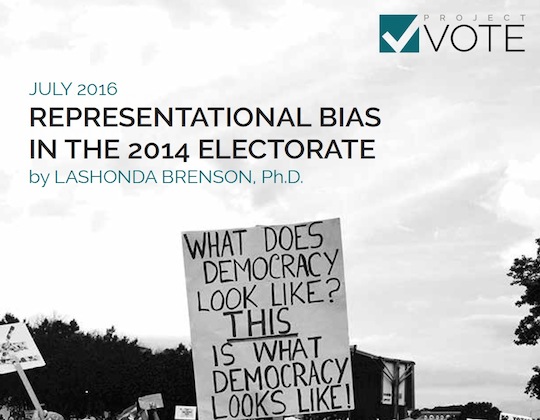Because the American Electorate Should Represent the American People

Low-income and minority citizens—both significant portions of the American population—are historically alienated from the electoral process. As a result, the proportion of the U.S. population that registers to vote and that does vote is highly skewed towards Whites, the educated and the wealthy.
These disparities in the electorate weaken our democracy and skew the national agenda by excluding from major public policy decisions the voices of the least powerful and most vulnerable citizens.
Project Vote research documents these disparities, and works to close the gaps by encouraging voter participation among underrepresented populations, and eliminate unfair barriers to voter registration and participation.
Most Recent / Relevant Items
- (139)
- (26)
- (76)
- (26)
- (11)
Advanced Filters and Sorting
Will the Latino ‘sleeping giant’ wake and vote this November?

During the past few presidential elections, national media began to speculate on the effect of the Latino electorate and even gave it the moniker “the sleeping giant.” But every year, despite increased potential, it seemed that giant hadn’t yet awakened. Indicators suggest this could be the year... Read more
Atkins: Lower courts striking down voter ID laws

In a series of rulings over the last two weeks, appellate courts across the country have been filling in the hole blown out of the Voting Rights Act of 1964 three years ago by the U.S. Supreme Court... Read more
Despite Gains in Participation Among Certain Groups, New Research Shows that the American Electorate Still Does Not Represent the American People
With just over three months until the 2016 election, a major new report from voting rights group Project Vote identifies where participatory gaps still exist in the American electorate. Read more
Representational Bias in the 2014 Electorate

Analyzing data from the U.S. Census Bureau's Current Population Survey, Representational Bias reviews the story of who was eligible to vote, who was registered to vote, and who did vote in the 2014 general election. Read more
Representational Bias 2014: Complete State Fact Sheets
Individual fact sheets for all 50 states and the District of Columbia, showing adult citizen population, unregistered population, and composition of each state electorate for 2012 and 2014 by race, age, income, education, marital status, disability status, and time at present residence. Read more
Representational Bias in the 2014 Electorate: Key Findings
A summary document highlighting key findings from Representational Bias in the 2014 Electorate. Read more
Representational Bias 2014 Fact Sheet: New Mexico
A one-page fact sheet showing population, unregistered population, and composition of the state electorate for 2012 and 2014, by race, age, income, education, marital status, disability status, and time at present residence. Read more
Representational Bias 2014 Fact Sheet: West Virginia
A one-page fact sheet showing population, unregistered population, and composition of the state electorate for 2012 and 2014, by race, age, income, education, marital status, disability status, and time at present residence. Read more
Representational Bias 2014 Fact Sheet: Georgia
A one-page fact sheet showing composition of the state electorate for 2012 and 2014, by race, age, income, education, marital status, disability status, and time at present residence. Read more
Representational Bias 2014 Fact Sheet: Mississippi
A one-page fact sheet showing population, unregistered population, and composition of the state electorate for 2012 and 2014, by race, age, income, education, marital status, disability status, and time at present residence. Read more